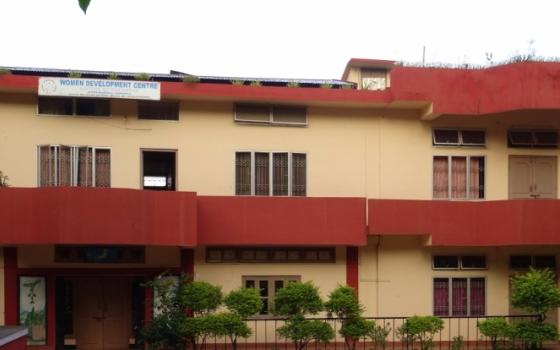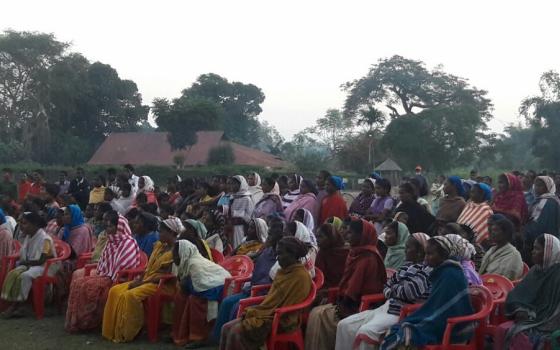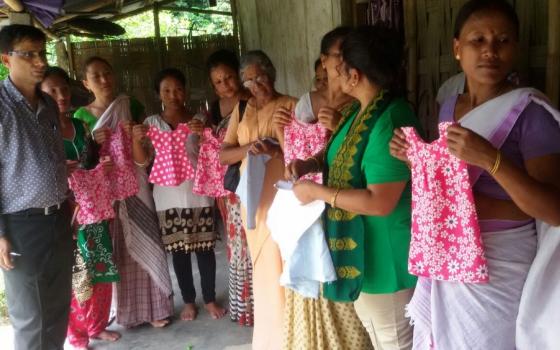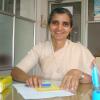Holy Cross Sr. Betsy Devasia has been working for the empowerment of women in northeastern India for nearly two decades.
She began with economically poor neighbors of her convent in Guwahati, a major city in the northeastern Indian state of Assam. She then focused on school dropouts. She also reached out to widows, who face social discrimination.
Today, hundreds of women and men have found a better life because of her service with the Women's Development Centre, the social service wing of the Holy Cross Sisters dedicated to bringing positive changes in the lives of women so they can stand on their feet. The 71-year-old nun, who is the director of the center, shared with Global Sisters Report her transition from a teacher to social worker and how it has given a new meaning to her religious life.
GSR: You are a teacher by profession. Why and how did you opt for social work?
Devasia: I would say it was an innocent comment from a little girl that drew me to social work. It happened on New Year's Eve in 1998. We were busy in the kitchen preparing dishes for the next day. Girls from the neighborhood were playing outside the kitchen. I asked a familiar face, "What will you have for New Year's breakfast?" The 9-year-old girl's face fell as she replied, "I cannot think of tomorrow. I had only some puffed rice today." I was stunned. The starving girl's face began haunting me then.
Our convent stood on a hilltop overlooking the hutments where many poor daily-wagers lived with their families. But it had never crossed my mind until then that many of them could have been going to bed hungry.
As I sat in our chapel that evening, I felt deep within to do something for the little girl and others. A voice inside told me to help my neighbors use their inherent skills and gradually get out of poverty.
I approached our congregation's Women's Development Centre for help. The initial idea was to train only local village women leaders. But we have gone much further and now work among people in Assam and Arunachal Pradesh [a neighboring state].
What did you do first? What were the initial challenges?
We began visiting our neighbors regularly. We found out that most people were good at cane craft. We requested Caritas India's assistance to form self-help groups of men and women. There is a great demand for cane craft items. Our people had the talent but no money to buy cane and implements.
The people agreed to our suggestion to work in groups with loans from bank. They also promised to repay the loan installments. Almost 95 percent of people of the first batch repaid their loan. This was the starting point. Soon, we had 102 self-help groups in and around Joypur Kharghuli [a Guwahati suburb].
We did face some hiccups. Sr. Lizy Thomas, who was in charge of our social work, fell ill and had to leave for treatment. When others, especially traders, saw us organizing the villagers to produce cane crafts, they offered them greater income. This divided the people. But most people remained with us.
What are the main activities of the Women's Development Centre?
Our people are engaged in different activities. Some 550 women groups in Assam's Dhemaji district are linked to a bank that gives them loans to start weaving. They are Mising tribal people who know the exquisite color combination for shawls and blankets. They are also engaged in raising pigs and agriculture.
Around 420 groups in North Lakhimpur [in Assam] opened kiosks selling sweets and other items with the bank loan. Some others invested in textile shops. Some started tailoring while others started renting out items for functions, such as tents, chairs, table and lights. Some go around houses to sell cloth items. Some have opened weaving looms or renovated old ones. All this has improved their standard of living.
We conduct residential coaching classes in Guwahati for tribal school dropout children from different northeastern Indian states. We started with five students in 2005. Now, we have 55 students in our hostel, attached to our center in Guwahati. Around 95 percent of these children are Christian. So far, 450 of our students have completed matriculation through the National Institute of Open Schooling [a project of the federal government to help school dropouts to complete at least matriculation]. It is a matter of great joy that 90 percent of the graduates have joined the university.
We have also adopted 15 villages in Assam's tea estates, where we work with 5,240 workers. Besides teaching them health care, we encourage them to start kitchen gardens, small shops, piggeries and goat farms. We also help in their children's education. School dropouts are trained to repair two-wheelers.
Girls are trained in tailoring and beautician courses. Now, around 250 youth attend our coaching classes, which prepare them to resume school.
We support 300 widows and elderly spinsters to start some occupation. The tribal society looks down on widows, so we try to get them social acceptance and help them face life's challenges as a group.
We have launched water-sanitation projects and hygiene-training programs in two districts of Assam. We also campaign against open defecation. Our center is the key resource center to train the staff and volunteers of the districts to work for the Clean India Campaign.
In Arunachal Pradesh, we work mostly with Mising tribal women. Mising is one of the 26 major tribes of that state, and they are exquisite weavers. Their textile is quite popular in India's handicraft and handloom industry. The Indian government identified around 6,600 Mising women and entrusted them to our care.
Our center in Guwahati is a nodal agency of NABARD [National Bank for Agriculture and Rural Development] that avails loans for these women. We have linked the women with the bank, and currently they have credit linkage of 14.5 million rupees [$228,345]. They regularly pay back their loans.
Who are your main beneficiaries?
We have reached out mostly to women and children. I never say no to a girl who comes to us. If I say no, they will never come back. We admit them to start the open school. So far, 80 percent of them go to college after passing matriculation. Others start some work. Even if they fail the 10th grade, we consider it worth the trouble because they learn something for life from the experience. They gain self-confidence. We had a girl who surprised us by passing all subjects through the open school program. She had never attended a formal school.
You have also reached out to flood victims. Why?
In 2004, there was a major flood in Guwahati, Udalguri, Morigaon. The situation was very grim. We went in a boat and saw the misery — children had no food, people had no place to cook, no candles for nighttime as electricity was off. People lived on embankments with no clean water. It touched us. We started to help the flood victims from then on. The Women's Development Centre is helping the flood victims, especially in Dhemaji, North Lakhimpur and Morigaon in Assam state.
Your neighbors were the main reason for all this? How has your work helped them?
We have trained our neighbors to make bamboo and cane products. We also organize sale of their goods through our center and at trade fairs in various parts of the country. We also help their children in education with free tuition and school materials, stationery and uniforms. Now they have three meals a day, better houses and clothes and medical facility. There is much more to be done as their improvement is slow because of alcoholism. Their liquor addiction has come down but not stopped altogether. We are making them aware of the ill effects of alcoholism.
What has given you the most satisfaction so far?
It is a matter of joy that the government has recognized our work among the poor. Our center has received the best NGO award from NABARD for our work in the rural area in 2016. It was given to us for nurturing 550 women self-help groups. It was for outstanding and extraordinary achievements in the promotion of women's empowerment and laying better foundation for children's education in Assam's Dhemaji district.
However, the real satisfaction comes from seeing the smile on the faces of our villagers. When we first met them, they were all dejected and gloomy. Now, they have gained confidence and work hard to improve their life. I also find them well-motivated. No villager now defaults loan repayment. All we did was to connect them with banks that loaned them funds to start small businesses. They have also developed saving habits. Most have started poultry farms or piggeries to earn additional income.
I find working with widows satisfying. So far, we have managed to settle some 300 widows. Before we met them, the widows accepted their low social status without a murmur. No more. Our intervention has helped them to assert their rights. They now wait eagerly for our visits.
So you have no problems now?
No, we do have challenges. Retaining dedicated staff is the main problem. We do not have sufficient funds to pay a high salary, a great attraction for the young social workers. Among the religious, the young ones are not attracted to social work. It is a hard life to get involved with the poor. I do not know about the future of our projects. But I believe God is walking ahead of me. I move on trusting in the Lord.
I do not claim to be a social worker. However, I find the mission worth trying. I am lucky that the government obliges whatever I ask.
Someone told me I was a fool to accept this task at this age. They are also anxious about my travel to different places. But I trust in the Lord.
What inspired you to become a nun?
Prayer and loving service of the sisters attracted me from my school days. I studied with the Carmelites of Mary Immaculate Sisters. I was attracted to the way they prayed in the chapel. They used to speak to us about religious vocation and asked us to pray for the gift of vocation.
Tell us about your family.
I am from a middle-class family in Kerala [southern India]. I am the second of seven children. Among the girls, I am the eldest. My parents taught us to love and do service, to respect every one and care for the needy. I studied with Carmelite sisters. After my bachelor's degree, when I visited a Holy Cross convent to buy some cloth, some sisters asked me about my future plans. After talking to them, I decided to join them. My family was upset. Finally, my father sent me to the convent, saying if I was not happy there, I was always welcome to come back. This was a great strength for me. But God has been merciful. He has kept me happy as a nun.
Do have a message for young women?
Just live by respecting yourself and others. Self-respect and self-dignity come from the realization that God is our father and from our ability to be loyal to Jesus and to our congregation. Everything will go on well then.
[Lissy Maruthanakuzhy is a member of the worldwide Congregation of the Daughters of St. Paul in India and a correspondent for Matters India, a news portal that focuses on religious and social issues.]









